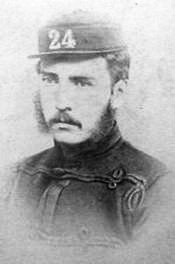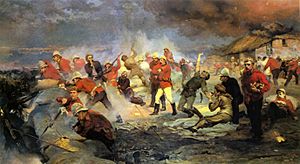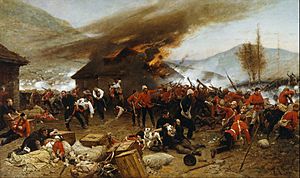Gonville Bromhead facts for kids
Quick facts for kids
Gonville Bromhead
|
|
|---|---|

Gonville Bromhead c.1872
|
|
| Born | 29 August 1845 Versailles, France |
| Died | 9 February 1891 (aged 45) Allahabad, British India |
| Allegiance | |
| Service/ |
|
| Years of service | 1867–1891 |
| Rank | Major |
| Unit | 24th Regiment of Foot |
| Battles/wars | Ninth Cape Frontier War Anglo-Zulu War Third Anglo-Burmese War |
| Awards | Victoria Cross |
Major Gonville Bromhead was a brave British Army officer. He was born on August 29, 1845, and died on February 9, 1891. He received the Victoria Cross, the highest award for bravery in the British military. He earned this medal for his actions during the Battle of Rorke's Drift in January 1879.
At Rorke's Drift, a small group of 139 British soldiers bravely defended their post. They successfully fought off about 4,000 Zulu warriors. Bromhead's story was later shown in the 1964 film Zulu, where he was played by Michael Caine.
Bromhead grew up in Thurlby, Lincolnshire, and came from a family of soldiers. He joined the 24th Regiment of Foot in 1867. His battalion was sent to southern Africa in 1878. There, he fought in the Ninth Cape Frontier War and the Anglo-Zulu War. He spent most of his later career in south Asia. He became a major in 1883 and served in the Third Anglo-Burmese War. He passed away in 1891 in Allahabad, India, at 45 years old.
Contents
Early Life and Military Start
Gonville Bromhead was born in Versailles, France, on August 29, 1845. He was the youngest child of Sir Edmund de Gonville Bromhead. His family had a long history of military service. His great-grandfather fought in Quebec, and his grandfather was a general in the American Revolutionary War. His father fought at the Battle of Waterloo. All three of his older brothers were also officers in the British Army.
Bromhead's family lived at Thurlby Hall in Thurlby, Lincolnshire. He went to Magnus Grammar School. In 1867, he joined the 2nd Battalion 24th Regiment of Foot. He became a lieutenant in 1871. His friends called him "Gunny." He was a good boxer and cricketer for his regiment. His soldiers liked him a lot.
During his time in the army, Bromhead started to have trouble hearing. However, this did not stop him from leading his men well. In February 1878, his battalion was sent to the British Cape Colony. They were there to help in the Ninth Cape Frontier War. Bromhead's company helped in several attacks. Later, his battalion went to Pietermaritzburg, Natal. They prepared for the invasion of Zululand.
The Battle at Rorke's Drift

When the Anglo-Zulu War began, Bromhead's battalion joined Lord Chelmsford's main army. They entered Zulu territory on January 11, 1879. The army crossed the Buffalo River near a small mission station called Rorke's Drift. This station was used as a supply point. Bromhead's company was ordered to stay and guard the mission.
On January 22, the senior officer at Rorke's Drift, Major Henry Spalding, left to find reinforcements. Lieutenant John Chard was left in charge. Around 3:00 PM, some horsemen arrived with terrible news. The main British camp at Isandlwana had been attacked and taken over by the Zulu army. The Zulus were likely heading to Rorke's Drift next.
An experienced former sergeant, James Dalton, convinced Bromhead and Chard to stay and fight. They decided not to retreat. Rorke's Drift had two main buildings: a hospital and a storehouse. The soldiers quickly built defenses between the buildings. They used bags of mealie (corn) from the storehouse. They also made holes in the hospital walls for shooting.
Just after 4:00 PM, about 4,000 Zulu warriors appeared. Many of the local troops helping the British ran away. This left only about 139 defenders. The Zulus, mostly armed with spears called assegais, charged the station. But the British soldiers fired their rifles, cutting them down. Still, the Zulus kept charging, especially near the hospital. Bromhead and his men fought fiercely hand-to-hand.
Around 6:00 PM, the defenses were getting too thin. Chard ordered the soldiers to pull back to a smaller defense line near the storehouse. Bromhead took a dangerous spot at the corner of the barricade. He stood next to Private Frederick Hitch. Bromhead used his rifle and revolver very well. He told his men to shoot carefully and not waste bullets.
At one point, a Zulu warrior almost speared Bromhead. But Private Hitch, even though his rifle was unloaded, scared the attacker away. Hitch was later shot in the shoulder. Bromhead gave him his revolver so Hitch could keep fighting with one arm. The Zulus kept attacking all night. But by early morning, they lost their energy and left. British reinforcements arrived later that morning.
After the Battle
Bromhead and the other soldiers who were not hurt stayed at Rorke's Drift for several weeks. They built stone walls around the area, calling it "Fort Bromhead." After the intense battle, Bromhead seemed quiet and tired. He might have been dealing with the stress of the fight.
The defense of Rorke's Drift was a huge success. It was celebrated by the British public and newspapers. Chard and Bromhead were praised as heroes. However, some other officers felt they were just doing their duty. Sir Garnet Wolseley, a high-ranking officer, even called the praise "monstrous."
Despite this, on May 2, Bromhead was promoted to captain and then to brevet major. He was also awarded the Victoria Cross. This was the highest award for bravery a British soldier could receive.
Later Career and Passing
When Bromhead returned to England, the people of Thurlby gave him a special award and a revolver. The citizens of Lincoln gave him a sword. He and Chard were invited to eat with Queen Victoria. But Bromhead was fishing in Ireland and missed the invitation. The Queen did not invite him again, but she sent him a photograph of herself.
In 1880, Bromhead was sent to Gibraltar. Then, in August, he went to India. He stayed there until March 1881. He returned to England to attend a special shooting school. He went back to India in 1883 with his battalion. He became a full major on April 4, 1883.
From 1886 to 1888, he served in Burma. His battalion helped to bring peace to the northern part of the region during the Third Anglo-Burmese War. After that, the battalion was sent to Allahabad, India. There, Gonville Bromhead died of typhoid fever on February 9, 1891. He was 45 years old.
Legacy
Gonville Bromhead was buried in the New Cantonment Cemetery in Allahabad. His Victoria Cross medal is still owned by his family. It is displayed at the Regimental Museum of The Royal Welsh in Brecon, Wales.
Michael Caine played Bromhead in the 1964 film Zulu. The movie is about the Battle of Rorke's Drift. In the film, Caine shows Bromhead as a fancy aristocrat who fought very well once the battle began. Bromhead is also a character in a story called "Relief" by Peter Ho Davies.
 | Laphonza Butler |
 | Daisy Bates |
 | Elizabeth Piper Ensley |


